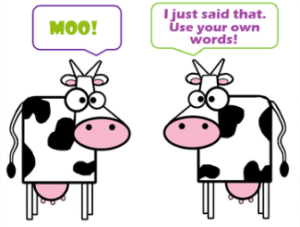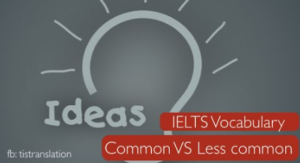▮ 言い換え・同義語で「語彙力」をアピール

スピーキングテスト受験者の多くが経験することですが、
話の途中で「言いたい単語が出て来いない」ことがあります。
テストに限らず、こんなことはよくありますよね。
テストでは「話しぶりの流暢さ」が 判定されますので、黙って考えてはいけません。
とにかく話を止めずに続けてください。 単語を思い出せなくても、
何とか別の言葉でその場をしのぐ柔軟さも必要です。
また、高得点を目指すのなら、同じ単語や表現を2度繰り返さないようにしてください。
同じ単語の繰り返しは「語彙力の貧弱さ」と判定され得点が伸びません。
評価基準の「Lexial Resource / Vocabulary・・語彙の豊富さ」に応えるため、
同義語や言い換えはたくさん覚えておきましょう。
今回は、話を止めない、高得点を狙うための「言い換え」「同義語」について学習しましょう。

「同義語」の例:
1) advantages and disadvantages – pros and cons, benefits, fors and againsts, good and bad points, bonuses and drawbacks, etc.
2) ways – measures, steps, solutions, courses of action, steps, initiatives, etc.
3) difficult – hard, complicated, tough, complex, not simple, not straightforward, etc.
4) I think – in my opinion, for me, I imagine that, I believe that, from my point of view, if you ask me, in my mind, etc.
「同義語」や「言い換え」を使うことは「語彙の豊富さ」を試験管にアピールするでしょう。
そしてあなたの評価が上がります。
また、「語彙の豊富さ」をアピールするために、
一般的でない単語「less common vocabulary 」を使うのも良いでしょう。
例えば、試験管から「“describe a car or motorbike that you would like to buy”
あなたが買いたい車やバイクを教えてください」と質問されたら、
「“… the kind of vehicle I’ve always wanted to buy is ….”」 と答えると良いでしょう。
“vecle”はless common vocabularyです。 transport, transportationなども使えます。
▮ Less common vocabulary 一般的でない単語

もう一つ例を挙げますと、「あなたの favorite car は?」と聞かれたら、
「トヨタカローラです」と答えると「語彙の豊富さ」をアピールできません。
以下のように答えると良いでしょう。
“My favorite car is Toyota Corolla. I love the Black color, actually my father was going
to buy a car last month and I advised him to buy Corolla, it is really nice”.
繰り返し申し上げますが、試験官は受験者の答えから「語彙の豊富さ」を採点しています。
できるだけ幅広い語彙を柔軟に使えるよう、
日ごろから英語インストラクターと練習してみてください。
Question:
One of the 4 criteria the IELTS Speaking is assessed on is Pronunciation . What does this mean?
a. Your pronunciation score is based on clarity and on speed.
b. Your pronunciation score is based on word stress, sentence stress and intonation.
c. both a and b











